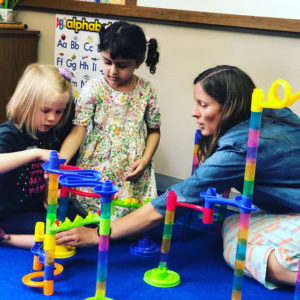 Recently, I was visiting my family in the Czech Republic, and with joy sparkling in my eyes, I was telling them about how my transition from elementary teacher to preschool teacher has been going. And in case you are wondering, it has been incredibly positive. But as I described my new role as a play-based co-operative preschool teacher, I saw it; that moment of dismissal at the word “play.” As we kept talking, my mom-in-law told me about the wonderful bilingual preschool in their own neighborhood, and surely there must be more academic teaching happening along with the play, especially with my background in elementary education. And honestly, I get it. Somehow, as adults, we learn not to trust play. It’s hard to measure joy, wonder, curiosity, creativity, social well-being, resiliency. We are biased towards product versus process. So asking one to trust the immeasurable is a challenge, especially with the academic push-down that has happened to kindergarten. The pressure on parents and preschool teachers to somehow show that these 4 year olds are ready to read and count and write is real. So let this be a reminder to all of us, myself included, when I start to doubt what my heart knows: what happens in my classroom every day is not “just play” but rather the foundation for all future learning.
Recently, I was visiting my family in the Czech Republic, and with joy sparkling in my eyes, I was telling them about how my transition from elementary teacher to preschool teacher has been going. And in case you are wondering, it has been incredibly positive. But as I described my new role as a play-based co-operative preschool teacher, I saw it; that moment of dismissal at the word “play.” As we kept talking, my mom-in-law told me about the wonderful bilingual preschool in their own neighborhood, and surely there must be more academic teaching happening along with the play, especially with my background in elementary education. And honestly, I get it. Somehow, as adults, we learn not to trust play. It’s hard to measure joy, wonder, curiosity, creativity, social well-being, resiliency. We are biased towards product versus process. So asking one to trust the immeasurable is a challenge, especially with the academic push-down that has happened to kindergarten. The pressure on parents and preschool teachers to somehow show that these 4 year olds are ready to read and count and write is real. So let this be a reminder to all of us, myself included, when I start to doubt what my heart knows: what happens in my classroom every day is not “just play” but rather the foundation for all future learning.
Thankfully, research supports this. The beautiful thing about play is that it’s intrinsically motivated. When children engage in self-selected play they are highly interested and engaged. This sustained interest is the foundation of focus and attention. It builds neural pathways in the brain that will later serve children in the academic setting. The Official Journal of the American Academy of Pediatrics (Sept. 2018) published an article entitled The Power of Play: A Pediatric Role in Enhancing Development in Young Children in which they conclude that, given their understanding of early brain development, learning is better fueled by facilitating the child’s intrinsic motivation through play rather than extrinsic motivations, such as test scores. You see, the more we push and promote things that can be measured, the more kids are going to feel like they don’t measure up. And this is the exact opposite of what all teachers and parents want, especially during these early years of childhood.
The benefits of play-based education are numerous and well documented. Play helps develop social skills, it fosters effective communication skills, it develops cognitive, critical thinking, and motor skills, it creates confidence, and inspires creativity. Play meets kids at their zone of proximal development. In other words, it is not developmentally age appropriate to expect 3 and 4 year olds to sit still, and learn new material through drills, flashcards, or worksheets. This is passive learning, rather than the open-ended, child-initiated play that paves way for higher order thinking. As Magda Gerber said, “Childhood is not a race to see how quickly a child can read, write, and count. It is a small window of time to learn and develop at a pace that is right for each individual child.” We forget that play is not just about having fun, but about taking risks, experimenting, and testing boundaries. It truly is the work of childhood.
As a preschool teacher I have the chance to create a space that brings wonder and delight to my students and nurtures the joyful, creative spirit that they naturally emanate. And through this process, I have also reconnected with the joyful, creative spirit in me. And so when my mom-in-law next asks if I’m still just playing at my preschool, I will smile and say that I’m actually protecting the wonder and magic of childhood, all while preparing them to be ready to take on kindergarten and later, the world.
Written By: Lisa Verbsky